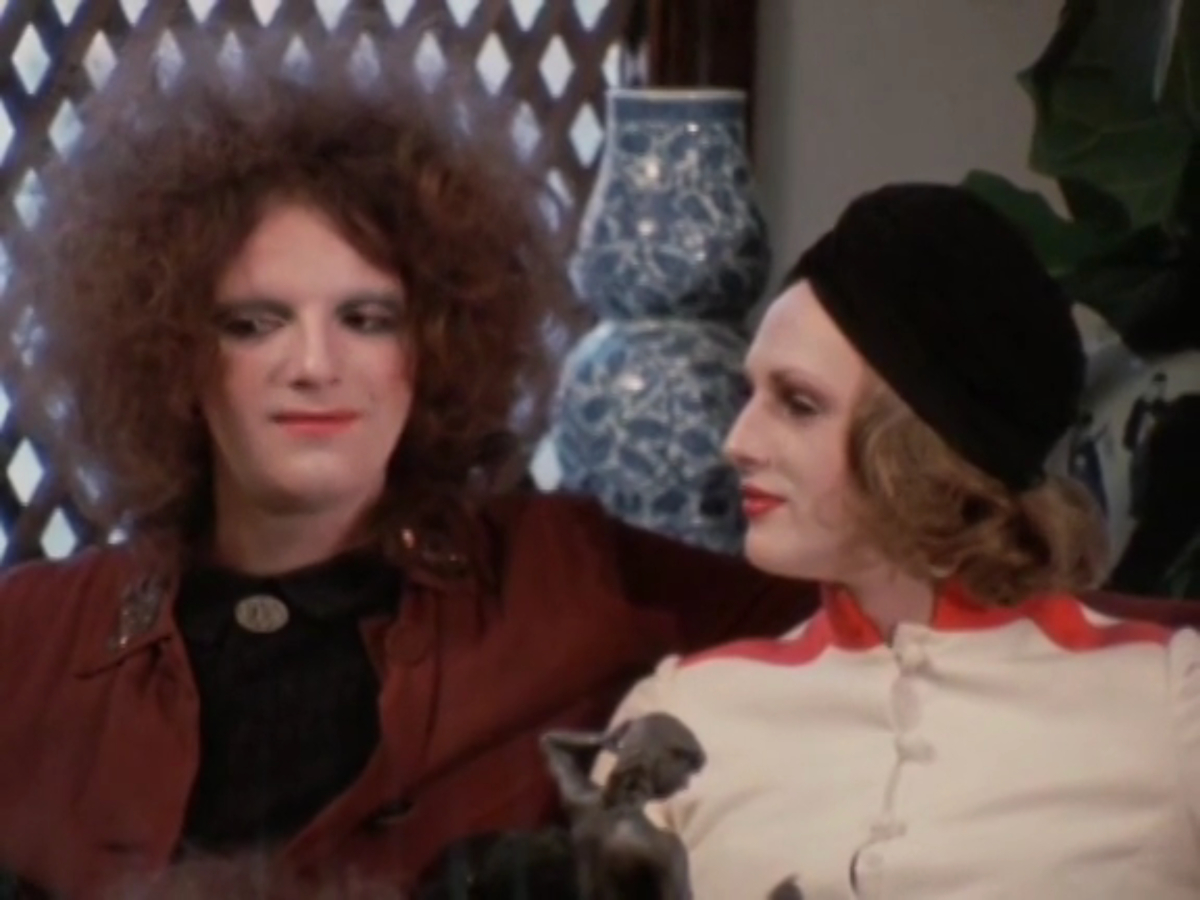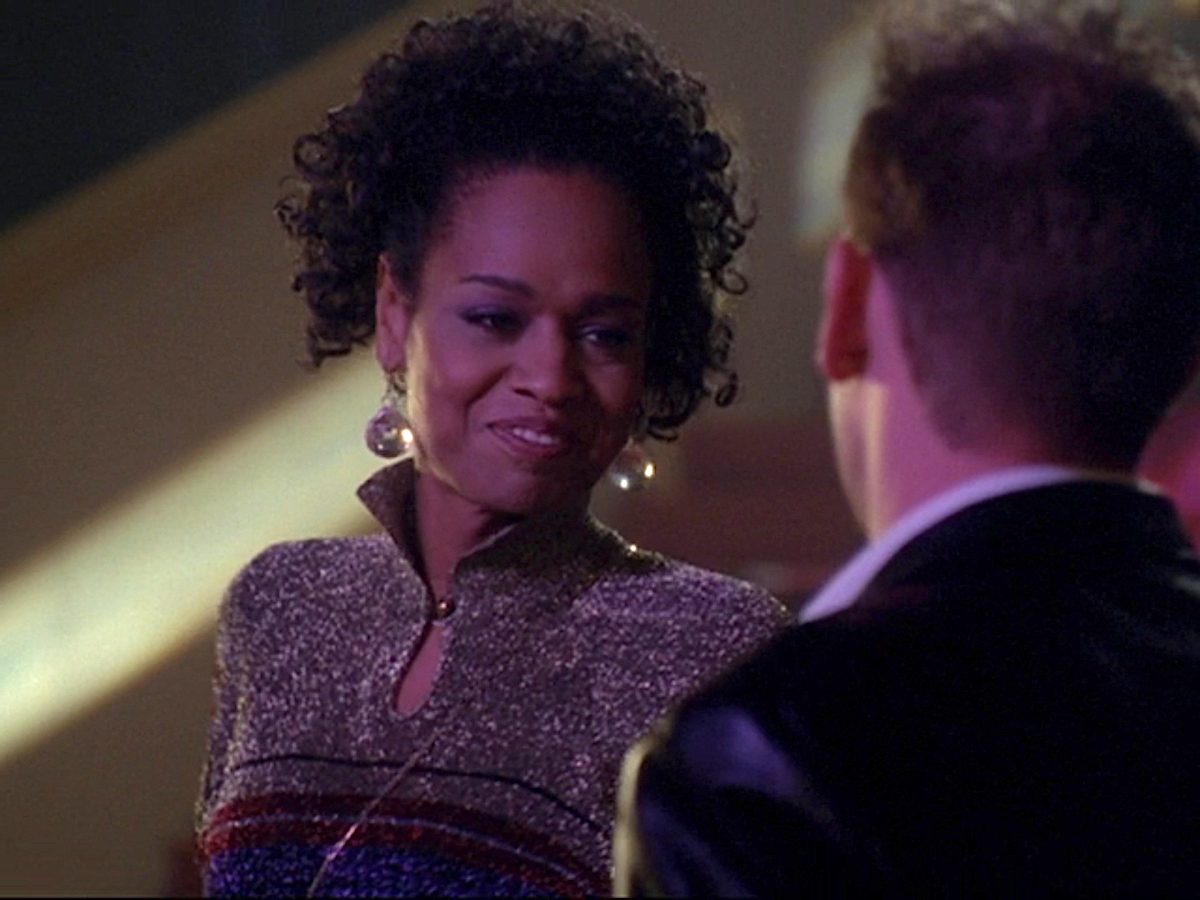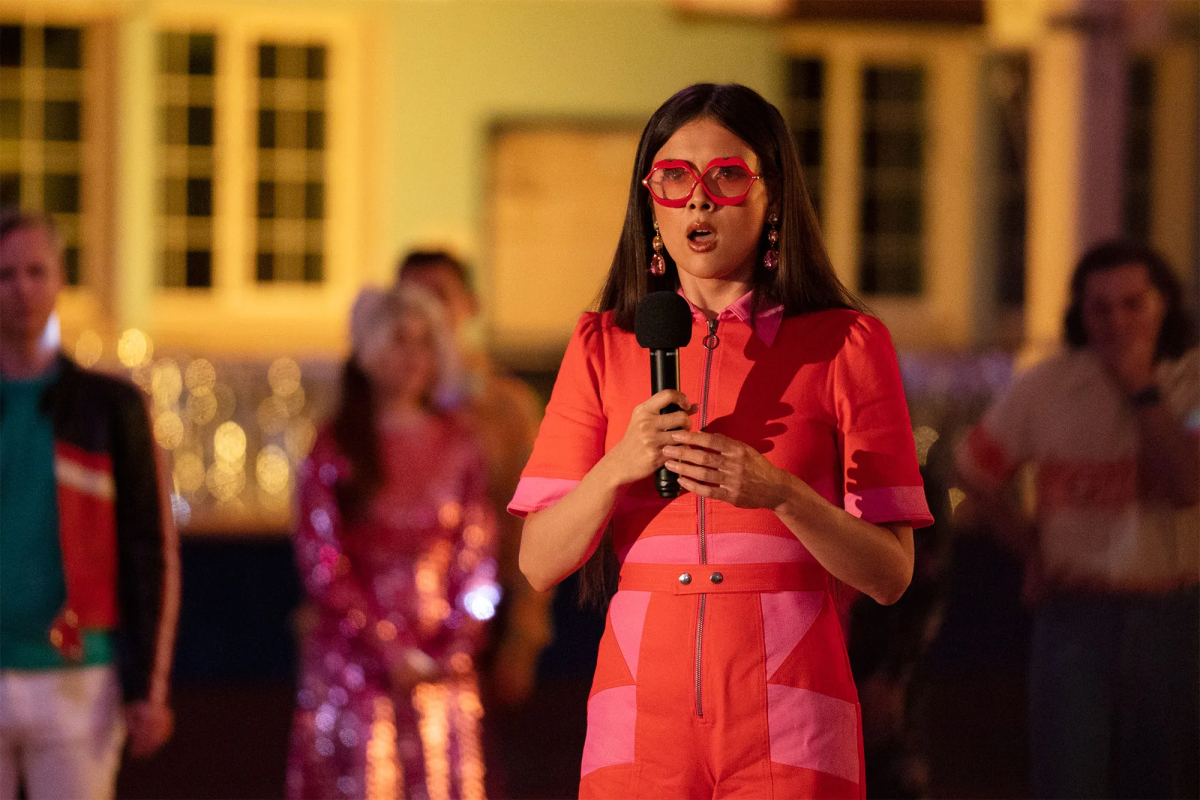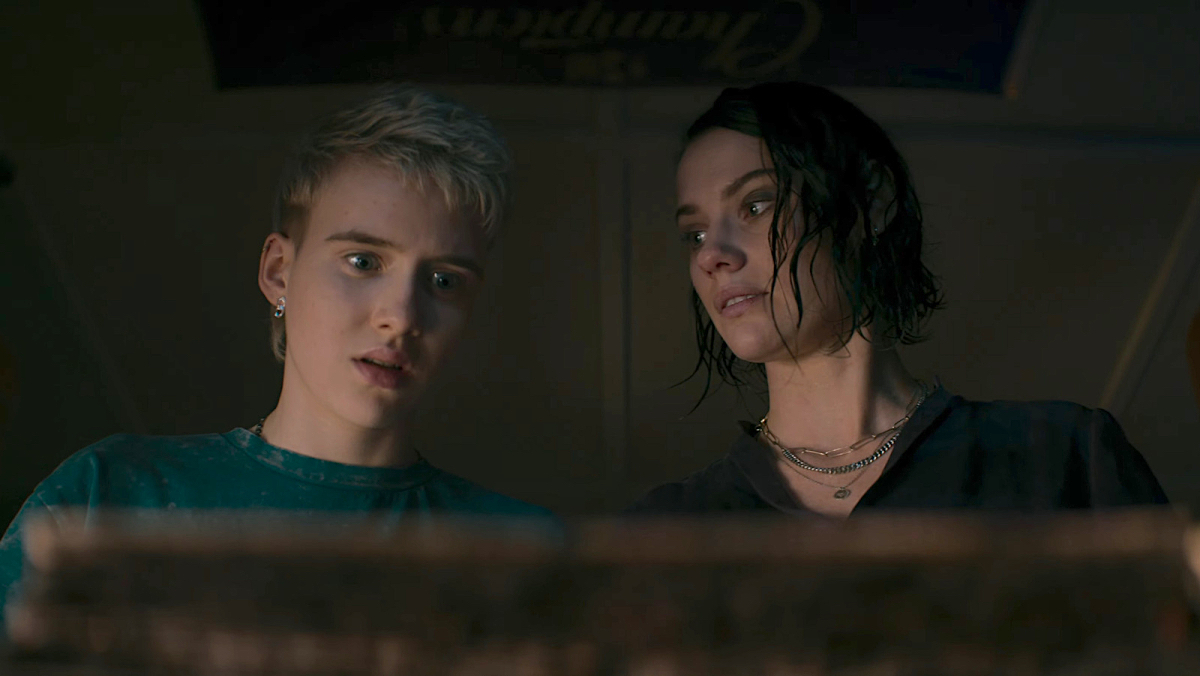Feature image of trans actors in cis roles: Michaela Jae Rodriguez in Loot, Sandra Caldwell in The Cheetah Girls, Morgan Davies in Evil Dead Rise, Holly Woodlawn in Women in Revolt, and Patti Harrison in Together Together
It’s Transgender Awareness Week, which means for seven days and seven days only, trans folks like myself will be visible to the world. We’ll be featured as models in fashion campaigns (given a ton of visibility with zero protection), people will read our books (read a 3 page excerpt PDF), corporations will honor and celebrate us (temporarily add a trans flag to their LinkedIn banner), and our loved ones will uplift us to demonstrate their allyship (let us know when we’re misgendered in their presence).
It’s a special time to be trans and I’m certainly not one to complain about getting a little extra attention, but sometimes it’s nice to take a break from constantly being aware of my own trauma or the trauma of my trans siblings. You see, when I say I want trans representation in TV and film, I’m not always talking about stories that focus on a character being disowned by their family or being denied healthcare or experiencing a hate crime. No, I’m talking about stories where the trans character’s transness isn’t the focus — where they’re allowed to be the worst behaved one or simply hot and getting laid or just really fucking good at their job.
For this reason, I went on a deep dive to investigate the history of these kinds of roles for trans actors, how they’ve evolved in modern media, and where we’re still missing opportunities for complex trans characters.
Andy Warhol and Paul Morrisey’s 1971 film Women in Revolt is an excellent satire of the Women’s Liberation Movement and a “fuck you” to Valerie Solanas, a sex essentialist who also happened to be the person who SHOT WARHOL IN THE STOMACH. The reality behind the making of this movie makes watching transfeminine actresses Candy Darling, Holly Woodlawn, and Jackie Curtis deliver absurd lines coated in privileged white feminism all the more delicious. Rather than playing characters rooted in the trauma of being trans, the three play over-the-top characters rooted in the trauma of being cis white women during second wave feminism. It highlights the absurdity of the time in all the right places. I mean come on, trans actresses playing over the top cis characters? What a concept.

Jackie Curtis and Candy Darling in Women in Revolt (1971)
Another 20th century film with surprisingly gender fluid casting is Law of Desire (1987), which tells the story of a filmmaker, his boyfriend, and his lover. Gay! But also… Trans! He has a trans sister, played by cis actress Carmen Maura, who has a cis ex-girlfriend played by trans actress Bibi Fernández. Dykes! Man, this movie just keeps getting better. Not only does Fernández play a cis woman, but she also gets to be the selfish, slutty type. She abandoned her own daughter to take up a new lover in Italy because she’s really, really hot… more of this please.
During this time period, there were also trans performers who made careers by being stealth. And as someone who is incredibly invested in seeing a trans James Bond in my lifetime, I’d be remiss to not discuss Caroline Cossey, the first trans model to pose for Playboy. Cossey played the role of “Girl at Pool” in For Your Eyes Only (1981), making her arguably the first trans Bond Girl. Cossey was egregiously outed following the film’s release and, like many other trans performers, was thrust into a life of advocacy thereafter. She took a truly horrid experience and turned it into something beautiful: tangible, positive change for trans folks to come. I think it’s rad that she’ll be known in history as a Bond Girl and fierce advocate for trans and human rights.
The most notable example of an actor working while stealth is Sandra Caldwell, a trans actress who, until 2017, spent her 35 year-long career playing cis roles. Considering what happened to Cossey and other out trans people, who could blame Caldwell for not wanting the attention of a largely transphobic public eye? Given the limits of Hollywood’s imagination, Caldwell would not have been cast in the roles she played had the industry known she was trans. It actually wasn’t until Caldwell played a trans character for the first time in the stage production of Charm that she came out publicly.

Sandra Caldwell in The Cheetah Girls (2003)
Caldwell belongs to the Baby Boomer generation, whose out trans population is only .1%. She says herself that trans folks now have much more freedom and don’t have to hide as much. Perhaps this is true in part because of the growing number of young, out trans folks, now reported to be 2.3% of Gen Z. I’m not sure what came first, the chicken or the egg (no pun intended). Did the rise in self-reporting create more complex roles for trans folks in media or did the increase in media representation for trans folks help more people come out? I have to imagine both are and will continue to be true. That’s kind of like… the whole argument for representation, right?
To that point, it was much easier for me to find modern examples of trans actors in complex roles than it was to find the ones mentioned above. Many trans actors in the 20th century and through the 2010s did not just play roles on-screen — they also played a role in social justice and advocacy spaces that made the introduction of a new generation possible. This new generation of trans actors are more and more getting to act in complex roles — cis, trans, and unspecified — and I am eating them up every chance I get.
Patti Harrison, for one, has a number of roles in her filmography that are complex outside of her transness. For example, in Together Together (2021), Harrison plays a gestational surrogate named Anna, which is about as overtly cis a role a trans woman could play.
But my favorite Harrison role — and one of my all-time favorite television roles period — is Ruthie on Shrill (2019 – 2021), the NSFW coworker of my dreams. I live for the harmless drama she brought to every episode and the way in which her transness was explicit, yet not the most interesting thing about her. Sure, Ruthie is trans, but did you know she’s also a veteran?! There’s one scene in particular that stuck with me after multiple rewatches which is in the episode “Salon” when Amadi (Ian Owens) thinks he’s having this tender ally moment with Ruthie, just for her to reveal that she lives with her boss and his partner not because her birth family disowned her, but because her chosen family is rich and she doesn’t have to pay rent. This was a moment Harrison constructed herself with the hopes to give Ruthie a story free of trauma porn and pity, yet rich in humor and depravity.

Patti Harrison in Shrill (2019-21)
Michaela Jaé Rodriguez made history when she became the first trans woman to be nominated for a lead acting Emmy for Pose in 2021. Her performance, and the show itself, are wildly important to trans storytelling in media, especially because it centers the Black trans femme perspective. Contrastly, in Loot (2022–), Rodriguez plays the role of Sofia: a hardworking, confident, take-no-bullshit, nonprofit Executive Director who’s reluctantly tasked with making sure her rich, incapable boss (Maya Rudolph) doesn’t fuck everything up. It was sweet to watch Sofia grow throughout the first season without her transness being mentioned once, and instead focus on her efforts to let her guard down a bit and have a little more fun than she typically allows. I’m glad the strikes are over and production on Season 2 can resume so we can see more!
I can only hope that Zoe Terakes performance as Hayley in Talk to Me (2023) will inspire filmmakers to create more on-screen trans bullies who have beef with the female lead. Okay… I’m begging. Hayley’s 90’s lover boy haircut and cunty attitude make them the perfect troublemaker to instigate the plot of one of my favorite movies of the year. When the character is first introduced, it’s through gossip about a party they’re throwing, making Hayley out to be the popular girl in school with an exclusive invite list. Boy were we wrong. Upon entering the party, we’re greeted by a menace in a short-sleeve-over-long-sleeve look that we transmascs know all too well. To say I was delighted would be an understatement.
Another favorite of mine is the absolute treat that is Nicole Maines as Lisa in Yellowjackets (2023). I know what you’re thinking, “Motti, Yellowjackets is literally a show all about trauma, how are you gonna tell me Lisa doesn’t have trauma?” Listen here, punk, Lisa does have trauma. In fact, she has mommy issues! But the issue is her mom is controlling, not that she’s transphobic. In fact, her trans identity doesn’t even get brought up! I’m hungry for more Yellowjackets for many reasons, most of them being gay, and Lisa is definitely one of them!
It’s never explicitly said that Danny in Evil Dead Rise (2023) is trans, but between the bleach blonde mullet, singular earring, chain, and LITERAL DJ SET IN HIS BEDROOM… Morgan Davies gave a performance that screams transmasc 20-something year-old in Bushwick. This was my first introduction to Davies, but I’m told with excitement that he’s in the new live action One Piece as a character named — get this — Koby, so I’ll definitely be checking that out.

Morgan Davies and Lily Sullivan in Evil Dead Rise (2023)
Complex roles for trans folks are much more abundant now than they were five, ten, and sixty years ago. And while I’m psyched to see that many of these parts allow actors to dig into something other than their transness and trans trauma, there remains a secret, more complex third option: explicitly trans characters who are just as complex as the ones whose transness is barely — or never — mentioned.
Look at me, trying to find a middle ground. Who am I, Dax Sheperd? All I’m saying is that we’ve seen the characters whose transness make up their entire personality, and as a result, their entire value (Che Diaz in And Just Like That, Max in The L Word, Sophia Burset in Orange is the New Black). We’re also now seeing characters played by trans actors whose transness is not so much a part of their characterization, if at all (Viktor in Umbrella Academy, Ellie in The Last of Us, Dr. Barbie in Barbie).
What about a character who’s loud about their transness but their entire thing is that they suck and fuck or that they’re annoying as hell or they’re a futuristic alien hunter? Could you imagine if McLovin from Superbad (2007) was a trans woman played by a trans actress?
You thought girl Superbad (Booksmart) was good? Wait until you see trans Superbad.
This piece about trans actors in cis roles is part of our 2023 Trans Awareness Week coverage. Our Senior Editor, Drew Burnett Gregory, felt like cis people were plenty aware of trans people in 2023 thank you very much, so this week trans writers will be taking us back into recent history — specially post-Stonewall (1970) to pre-Tipping Point (2013).



Just commenting to say that I love Nicole Maines sooo much.
Also a shout out to Mackenzie Hargreaves in Neighbours, whose story on introduction was related to her transness, but is now not a major factor, and she has instead the trauma of being a widow at 21(cause y’know, soaps be like that)
Superbad McLovin would’ve been hilarious but I feel like the language would be different. Read a fucking book cis white boy doesn’t hit the same.
Fascinating primier and watchlist for trans people in incidental roles (whether cis in intention or not). Love Sandra Caldwell and Patti Harrison. Absolutely adore the encouragement to check Candy Darling films like Women in Revolt (long on my watchlist), although I was confused by framing and explanation of Valerie Solanas as a garden variety and apparently “priveleged” sex essentialist? Could be the flow of the sentences, but it seems to miss the mark on a) general discourse in feminist circles in the 1970s that given comments of Candy Darling’s peers about her comments/reactions about gender or other marginalized people made me think that contemporaneoustrans/transfeminine people were not always above themselves, b) ignores her masterful deconstruction of Freudian psycholoanalylsis (whether as actually theorized or misapplied by Freud’s followers) that would have harmed trans women and cis women in shared and unique ways (although she would go back and forth on what aspects she actually was and wasn’t serious about in the manifesto), and c) she was a mentally ill person impacted by an alleged deeply traumatic childhood and funneled into infamous hospitals and prisons after the shooting, leading to what’s understood as a forced hysterectomny at Bellevue (1960s/70s medicine is a horror story for cis women and gender variant people as any women and gender historian would know). There is no simple summary of exactly why Solanas shot Warhol either (paranoia from a misplaced script and her untreated mental illness spiraling out of control until Warhol was almost assasinated by her hand). This context does and would not override Warhol’s pain and on-going suffering afterwards, but it seems like as a quick summary what was written here really reductive of who Solanas actually was, represented, or allow for a more nuanced understanding to what Warhol himself was responding to in his film. Also side note: the documentary Beautiful Darling heavily interprest that Warhol himself would virtually abandon centering trans women in his films as by dismissing the practice as an old phase of his and obviously had some questionable connections of his own (re: promoting causal white supremacist singer Nico). If there’s critique of the white privilege of mainstream women’s liberation in his film, I would guess its incidental at best.
Jojo Brown as mean girl Mindy in Single Drunk Female
Motti, this post really reveals the roles of trans actors in cis roles, and I love how you highlight the importance of showcasing trans characters without always focusing on trauma. I also point about finding a middle ground in representation is spot on, too. As media continues to evolve, having more nuanced and layered trans characters is key. I’m working complex projects and analyze the shift in representation over the years in the law meaning, so I discovered services mentioned in this article https://www.linkedin.com/pulse/best-5-services-get-business-law-assignment-help-studymoose-om8ne that can help with your research.